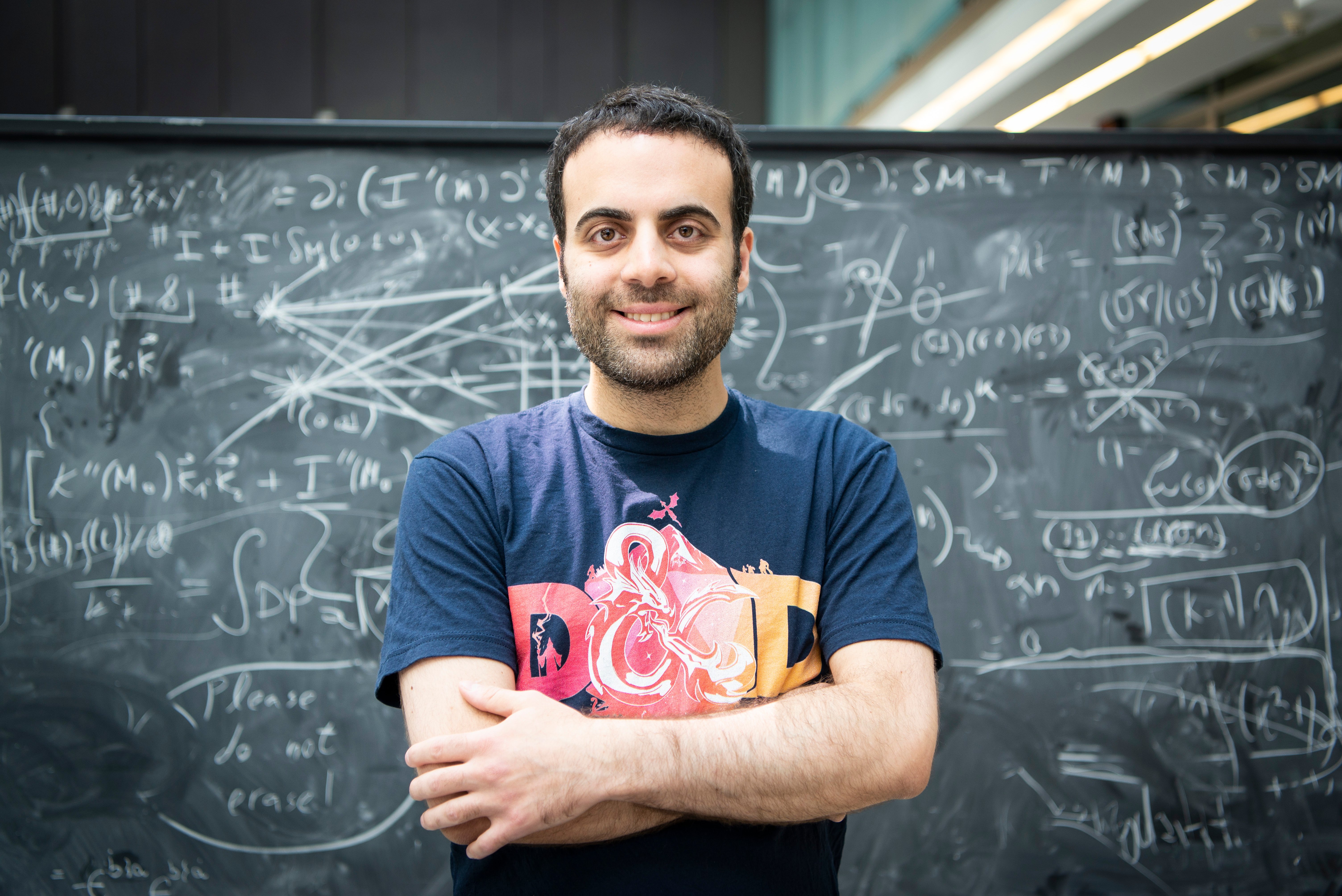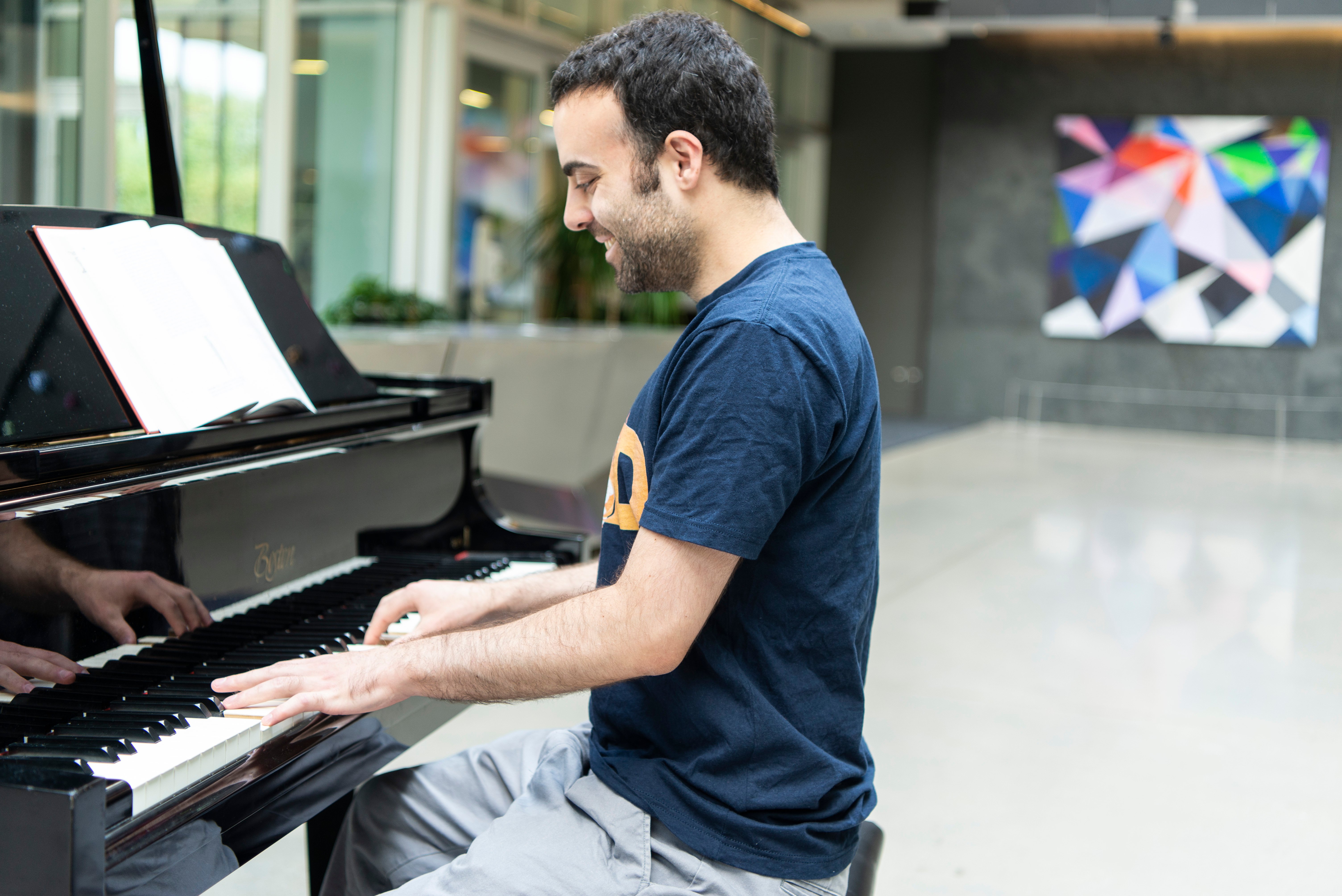If Barak Shoshany could travel back in time to a specific point of his journey at Perimeter Institute, what time would he pick?
That’s a tricky question to ask someone who thinks a lot about time travel paradoxes and the nature of causality, especially hours after he’s just given a seminar to Perimeter researchers and students on the topic.
Immediately, he gets to work determining the conditions: “In this scenario, is my consciousness going back to my own body, or am I my current self, going back to meet my past self?”
The thoughtful response is no surprise considering Shoshany’s interest in time travel. Shoshany first came to Perimeter from Israel in 2014 to pursue a master’s degree in the Perimeter Scholars International (PSI) program. He remained for his PhD with faculty member Laurent Freidel. After graduating, he had a short-term research position with associate faculty member Niayesh Afshordi and then taught part-time at the University of Toronto.
In recent years, Shoshany has been an Assistant Professor in the Department of Physics at Brock University in St. Catharines, Ontario and a sessional lecturer of computational science at McMaster University in Hamilton, Ontario. Now he is a visiting researcher with Perimeter, and this is his first time back after five years.
“I got some experience teaching when I was at Perimeter, and I really loved it. The material I taught PSI students was very technical and advanced, but at the same time I participated in outreach events where simplicity was key,” says Shoshany. “Now I’m teaching mostly undergraduate courses at Brock, where the level is somewhere in between, and I’m really enjoying it.”
Like any observant time traveller, he takes stock of what has changed. Notably, a moon has been installed in the atrium as part of an event for Perimeter’s 25th anniversary celebrations. There are new wood accents in the bistro. The rest, he says, seems more or less the same.
Shoshany’s talk, presented on February 4, 2025, had a dual focus. In one half of the talk, he presented the results of a recent paper showing how time travel paradoxes can be resolved using a concept he calls “entangled timelines” within the framework of quantum mechanics.
“While my PhD at Perimeter was in quantum gravity, after I graduated I decided to focus on the nature of time and causality in general relativity and quantum mechanics, and in particular, faster-than-light travel, time travel, and their implications,” Shoshany says. “We don’t yet know if these forms of travel are physically possible, but studying them could still give us great insights into fundamental physics, whether they are possible or not.”
The other half of his talk focused on a new software package he recently released, called OGRePy. Shoshany originally wrote a package called OGRe (Object-Oriented General Relativity), written in the programming language Mathematica in 2021. Shoshany says OGRe has seen good adoption in the research community, but Mathematica is expensive and therefore not accessible to everyone. In September 2024 he released OGRePy, a version of this package adapted to Python, an open-source programming language that is freely available.
“General relativity is one of the most beautiful theories ever invented, but it involves extremely complicated calculations,” says Shoshany. “The purpose of my package is to allow researchers to do these calculations on a computer, using a simple and easy-to-use interface, and the package is explicitly designed to prevent common calculation errors.”
The package name is a nod to tabletop game Dungeons & Dragons (D&D). And that brings him back to the question at hand regarding time travel.
“You know, if I could go back and relive a certain period of my time at Perimeter, I’d probably pick my fourth year, when I was the gamemaster for the largest D&D campaign in Perimeter’s history,” he laughs. Shoshany’s campaign included a total of 27 players over its run, most of them Perimeter residents and visitors – from PSI students to faculty.
“Maybe I should say I’d go back to a crucial point in my PhD research, but I met a lot of people playing D&D who became lifelong friends, and that is valuable too – plus, these friendships did lead to interesting research collaborations.”
Shoshany is quick to acknowledge that his D&D campaign was modelled on a previous D&D campaign run by Daniel Gottesman, then a Perimeter faculty member and now a Distinguished Visiting Research Chair. “Before I applied to the PSI program, I remember seeing that a Perimeter faculty member was running a D&D campaign, and thinking that was very cool and unusual. A year later I found myself playing in that very same campaign!”
Another touchstone for Shoshany was his time with the PI Orchestra. “I’ve always loved composing and playing music,” he says. A lifelong musician and multi-instrumentalist, he served as the orchestra’s conductor for one term, an experience which remains a highlight of his days spent here.
“Perimeter was a really great time in my life, and I definitely wouldn’t be the person I am now without it, both personally and professionally,” he says. “I really got a lot from the whole experience – researching, studying, doing outreach, meeting interesting people, and just being part of the wonderful Perimeter community.”
À propos de l’IP
L'Institut Périmètre est le plus grand centre de recherche en physique théorique au monde. Fondé en 1999, cet institut indépendant vise à favoriser les percées dans la compréhension fondamentale de notre univers, des plus infimes particules au cosmos tout entier. Les recherches effectuées à l’Institut Périmètre reposent sur l'idée que la science fondamentale fait progresser le savoir humain et catalyse l'innovation, et que la physique théorique d'aujourd'hui est la technologie de demain. Situé dans la région de Waterloo, cet établissement sans but lucratif met de l'avant un partenariat public-privé unique en son genre avec entre autres les gouvernements de l'Ontario et du Canada. Il facilite la recherche de pointe, forme la prochaine génération de pionniers de la science et communique le pouvoir de la physique grâce à des programmes primés d'éducation et de vulgarisation.


